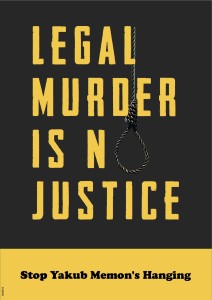NTUI STATEMENT
Why we condemn the hanging of Yakub Memon: New Delhi, 30 July 2015: A short while before 7 am this morning, the sole convict of the 1993 Mumbai blasts, Yakub Memon, was hanged until declared dead at the Nagpur Central Jail. Memon was charged under Terrorist and Disruptive Activities Act (TADA) for his involvement in acts of terror, which allegedly included planning and financing it.
The hanging came at the end of 22 years since the incident in which Memon has already been incarcerated for 21 years. In the 20 hours preceding the hanging, efforts at the highest level of both the judiciary and the government worked to ensure it happened. Two pleas by Memon were rejected by the Supreme Court. A mercy petition was turned down by the country’s President late last night. The Supreme Court, in fact, for the first time ever in its history, ruled at 5 am this morning, but within less than 2 hours the government was ready to hang Memon. This undue haste was neither called for nor justified at the end of a case that has gone on for more than two decades.
Acts of terror by individuals, groups or the state is a threat to democracy and disrupts social life. Terror, directed at innocent people, targets communities and thereby undermines solidarity within the working class by widening divisions within society. While adequate punishment of the guilty is essential, as established by due process of law it is equally fundamental to protect the right of citizens to equality before law. It is not coincidental that the past-decade executions through the death penalty have been exclusively of muslims. It is also not coincidental that except for the left parties, no other political party has stood against capital punishment. It is also not coincidental that due process of law and laws of natural justice were not followed in these cases with the government playing a vengeful role to satisfy ‘collective conscience’. Equally, there is robust evidence now that 9 out of every 10 people who have been hanged in this country are either dalits or muslims.
In sharp contrast, those involved in innumerable instances of riots and pogroms by members of political parties and even legislators, including with the direct or indirect support of government, have in most cases not even been convicted. This inequality perpetuated through the criminal justice system and the judiciary not just amounts to inequality before law but also reflects the lack of autonomy of the judiciary from the executive. The fact that those on the death row have also failed to convince the president of the country to exercise the constitutionally provided power of pardon to protect the constitutionally provided right to life of every citizen also shows the inseparability of the presidential powers from that of the influence of the political class. The fact that 9 out of 10 persons handed out death penalty are muslims and dalits reinforces the inequality in and the deep prejudice of the legal system.
In the law on death penalty the Supreme Court has held, and reiterated, that if indeed there are ‘mitigating’ factors then a death penalty may be commuted. In Memon’s case the critical mitigating circumstance was that he cooperated with the investigative agencies and ensured that several of the accused surrendered. This too was over looked when in fact the power of the presidential pardon is to go into issues such as these that may go beyond the narrow confines of the rule book. If the presidential pardon is to merely mirror the views of the judiciary and the executive then there would have been no need for it. In this sense the President has, and now repeatedly, acted against the spirit of the constitution and democracy itself.
Anticipating protests, government, across the country and especially in Memon’s city, Mumbai, and in the national capital, has deployed its law and order machinery. In the last twenty-four hours demonstrators, against the death penalty have been detained and several hundred have been taken into preventive custody. Death penalty is today the ultimate instrument to terrorise a community, to crush dissent, and of course to isolate and demonise one community for party political ends and electoral gain.
We oppose the death penalty as it amounts to retribution which is both barbaric and the ultimate denial the right to life.
Gautam Mody
General Secretary

Leave a Reply